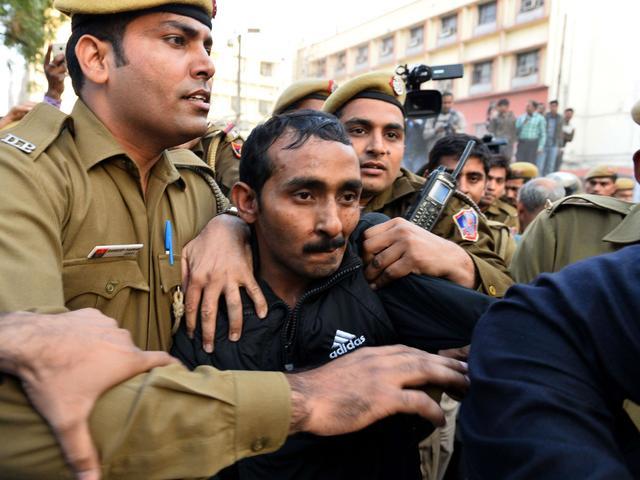Serial Rapist claimed 200 victims in 15 Years.. they finally said 'enough'
For a decade, Akku Yadav's reign of terror haunted a slum town in India, claiming the lives of nearly 200 women. However, the tide of vengeance turned when the abused women united to deliver their own merciless justice.

For a decade, Akku Yadav's reign of terror haunted a slum town in India, claiming the lives of nearly 200 women. However, the tide of vengeance turned when the abused women united to deliver their own merciless justice.
In the dimly lit alleys of Kasturba Nagar, a slum in the heart of India, a tale of horror, courage, and controversial justice unfolded—an event that would resonate across the world as both a beacon of empowerment and a stark symbol of a broken justice system. The narrative of Usha Narayane and the women who took down their tormentor, Akku Yadav, is not merely a story but a grim testimony and a somber reflection on societal failings.
Prelude to Vigilantism
The air in Kasturba Nagar was thick with despair for years. Usha Narayane, a college-educated young woman, stood as a beacon of hope amongst the squalor—a living example that even the most marginalized could rise. However, when a local goon named Akku Yadav and his men targeted her for a heinous crime, Usha’s quick thinking and a gas stove's knob became her shield, warding off an immediate threat with the peril of an explosion. This act of defiance marked a turning point.
As described by Nicholas D. Kristof in "Half the Sky: Turning Oppression into Opportunity for Women Worldwide," women in many parts of the world, including Kasturba Nagar, often endure abuse with stoic docility, a trait ingrained since childhood. However, what followed Usha's act was a clear break from this conditioned acceptance—a collective roar for justice.
The Revolt
The neighbors of Kasturba Nagar, long silent and fearful, found their voice in Usha's resistance. When Yadav fled to police protection, the people, inspired by Usha's courage, marched to his home and set it ablaze. In an unprecedented display of unity, the community vowed to bring an end to Yadav's reign of terror. The retaliation was not a mere reaction; it was a movement birthed by the incessant cries for help that were ignored by those sworn to protect.
On August 13, 2004, a date that would go down in infamy, the women of Kasturba Nagar, equipped with the remnants of their shattered patience—stones, knives, and chili powder—marched to the courthouse in Nagpur. They defied societal norms, geography, and their own fears. Their march was a physical manifestation of a metaphorical journey from subjugation to agency.

The Courthouse Confrontation
The courthouse, with its pristine white tiles and towering presence, became the arena where years of oppression met its violent end. As reported by "Outlook India," Akku Yadav, under the false security of police protection and judicial corruption, taunted the women he had wronged. What he perceived as impunity was soon to be shattered. The women unleashed their fury, armed not just with weapons but with an insatiable hunger for justice. The gruesome outcome—a man lynched by the very women he had victimized—left the walls of the courthouse a canvas of his blood.

Aftermath and Acclaim
The bloodied women returned to Kasturba Nagar not as perpetrators but as liberators. The community's response was not of condemnation but of celebration—a testament to the relief and justice they felt had been served. When the law failed to protect them, they found their verdict outside its corridors. The arrest of Usha and four other women sparked an outcry that reverberated beyond Kasturba Nagar. The support was overwhelming; lawyers, judges, and women's organizations across India rallied for their cause.
The Guardian reported an act of solidarity that would challenge the very foundations of the legal system: 200 women claimed responsibility for Yadav's death, ready to bear the consequences of their collective action. The charges against them were eventually dropped, not out of legal necessity but societal pressure and, perhaps, a recognition of the desperate conditions that led to such an act.
Legacy and Change
The aftermath saw Usha Narayane redirect her path from hotel management to community service, founding the Kasturba Nagar Community Project, focusing on empowerment through education and skill development. In an interview with the New York Times, Kristof reflected on the incident, acknowledging the complexity of condoning a lynching but recognizing the profound impact of Usha's actions and the hope they signified.

Conclusion
The events of Kasturba Nagar pose difficult questions about the nature of justice and the role of individuals in enforcing it. It is a stark reminder that when the legal system fails to act, it risks delegitimizing itself, giving space for vigilante justice to take root. Usha Narayane and the women of Kasturba Nagar didn’t just fight against a single oppressor; they challenged a pervasive culture of silence and subjugation.
Their story is not an endorsement of vigilantism but a call to action—a plea for societies worldwide to reflect on the desperation that drive.





